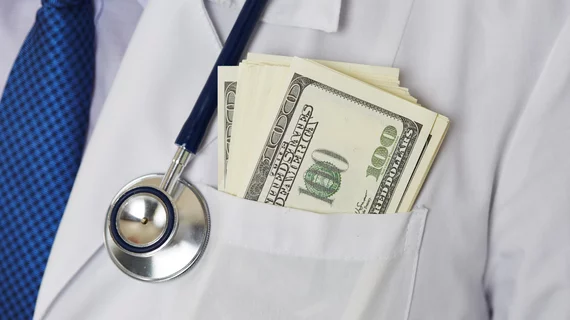Cardiologists received $1.3B in industry payments over 10-year period, No. 3 among all healthcare specialties
Cardiologists received $1.29 billion in industry payments from 2013 to 2022, one of the highest totals for any specialty, according to new data published in JAMA.[1]
Industry payments made to physicians can be for consulting services, speaking engagements or even travel and lodging expenses.
“Despite evidence that financial conflicts of interest may influence physician prescribing and may damage patients’ trust in medical professionals, such relationships remain pervasive,” wrote first author Ahmed Sayed, MBBS, a specialist with the Ain Shams University in Egypt, and colleagues. “The Physician Payments Sunshine Act led to the creation of the Open Payments database in August 2013, a repository of industry payments to health care professionals. We examined the distribution of payments within and across specialties and the medical products associated with the largest total payments.”
Sayed et al. explored Open Payments data for payments reported by physicians from August 2013 to December 2022. Overall, orthopedic surgeons received the highest sum of industry payments, totaling $1.36 billion, during that time period. Neurologists and psychiatrists were grouped together and came in at No. 2, receiving $1.32 billion. Cardiologists ($1.29 billion) were No. 4 on the list, and hematologists/oncologists were No. 5 ($825.79 million).
Study examines high industry payments for prescription drugs, medical devices familiar to cardiologists
The authors also studied which specific prescription medications were associated with the most industry payments. The blood thinner rivaroxaban/Xarelto ($176.34 million) and anticoagulant apixaban/Eliquis ($102.62 million) topped that list. They were followed by adalimumab/Humira, an immunosuppressive drug used to treat rheumatoid arthritis in adults ($100.17 million).
On the other hand, the three medical devices associated with the most industry payments were the da Vinci Surgical System from Intuitive Medical ($307.52 million), the Mako SmartRobotics from Stryker ($50.13 million) and the CoreValve Evolut transcatheter aortic valve replacement device from Medtronic ($44.79 million).
Read the full research letter here.

